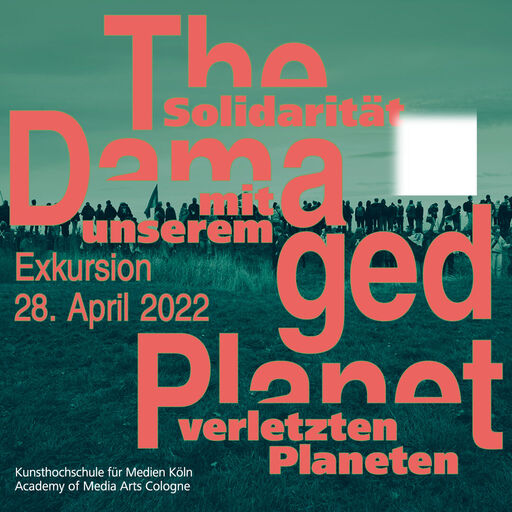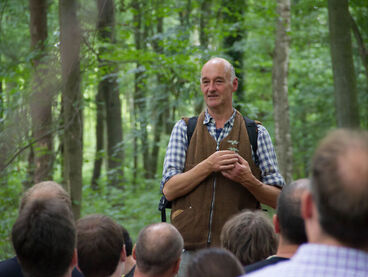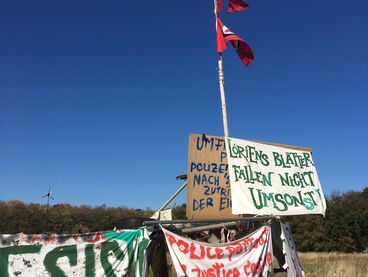- Exhibition
- Awards
- Library
- Speech
- edition KHM
- Festival / Award ceremony
- FG exMedia
- FG Film und TV
- FG Kunst
- FG Kunst- und Medienwissenschaften
- Movie screening
- Glasmoog Books
- Glasmoog - Raum für Kunst und Diskurs
- KHM Journal
- Concert
- Cooperation
- LAB Jahrbuch
- LECTURE Reihe
- Teachers elsewhere
- literature
- off topic
- News articles
- Publications
- Job offers
- Study
- TV broadcast
- Event
- all
The Damaged Planet – Michael Zobel – Woods not coal

As part of the series of events 'The damaged Planet' starting in the winter semester of 2021/22.
Please register for events by email: thedamagedplanet@khm.de
Please notice the current corona rules.
Forest not Coal - A Walk In and Around the Hambach Woodlands
The Hambach Forest is certainly Germany's best-known forest – since 2018 at the latest. Of what was once the largest forest in the Rhineland, 10% remain, while 90% have been sacrificed for brown coal over the last 40 years. And contrary to all statements from politicians and RWE, the rest of this wonderful forest has not been saved, but is still facing terminal destruction today. Since 2012, the "Hambi" – as the forest is affectionately called – has been inhabited by mostly young people who want to save the remaining forest with tree houses and their bodily presence and resistance. On our approximately three-hour hike, I want to show pictures, the forest and its condition, the tree houses, the clearing edge, the barricades, the excavators, the big hole ... and I want for conversations to emerge, within the group, but maybe also with people from the forest who can explain best why they are still there and what drives them.
Michael Zobel (*1959), father of two children and grandfather of two. Following a career path that was not always straightforward, I have been out and about in the forest and in nature almost "around the clock" for 20 years after my training at Haus Ternell. I can be spotted around Aachen, in the border triangle, in the Euregio, in the High Fens. Working with every conceivable group, from kindergartens to secondary schools, from staff outings to institutions for the disabled, from biology classes to family trips, from children's birthdays to anniversaries. And at almost any time of day, from sunrise to dusk and night hikes. In addition, there are other themes I am regularly engaging with, such as LandArt, art in and with nature, further education, holiday games, and thematic guided tours of all kinds. The range is constantly being supplemented and updated.
The KHM’s series of events began in winter semester 2021/22 with the earth system researcher and marine biologist Antje Boetius and the dramatist Frank M. Raddatz, on their collective project Theater des Anthropozän (Theatre of the Anthropocene). Uriel Orlow’s research-based and multidisciplinary praxis saw plants as political actors and deals with the ghosts of colonialism. Aneta Rostkowska, the director of the Temporary Gallery in Cologne, talked about her curatorial praxis, in which the emancipatory potential of plants plays a special role.
Organisers: Pascal Dreier, Beate Gütschow, Thomas Hawranke, Ute Hörner, Fatima Kastner, Isabell Lorey and Kathrin Röggla.
Summer semester program 2022 >>>
The Damaged Planet – Symposium
with international guests at the Aula of the KHM and online via Zoom, Friday and Saturday, May 6 and 7, 2022
Workshop "Future of Life"
with the dramaturge Dr. Frank M. Raddatz, the political scientist Christopher Coenen and Prof. Kathrin Röggla from the KHM, Wednesday and Thursday, June 22 and 23
Winter semester program 2021/22
Antje Boetius und Frank M. Raddatz: Theater des Anthropozän
Wed, 27/10/2021, 7 pm, auditorium
Uriel Orlow: Conversing with Leaves
Thu, 11/25/2021, 7 pm, online
Aneta Rostkowska: Moss time. Towards vegetal curating
Thu, 27/01/2022, 7 pm, online
- Exhibition
- Awards
- Library
- Speech
- edition KHM
- Festival / Award ceremony
- FG exMedia
- FG Film und TV
- FG Kunst
- FG Kunst- und Medienwissenschaften
- Movie screening
- Glasmoog Books
- Glasmoog - Raum für Kunst und Diskurs
- KHM Journal
- Concert
- Cooperation
- LAB Jahrbuch
- LECTURE Reihe
- Teachers elsewhere
- literature
- off topic
- News articles
- Publications
- Job offers
- Study
- TV broadcast
- Event
- all











